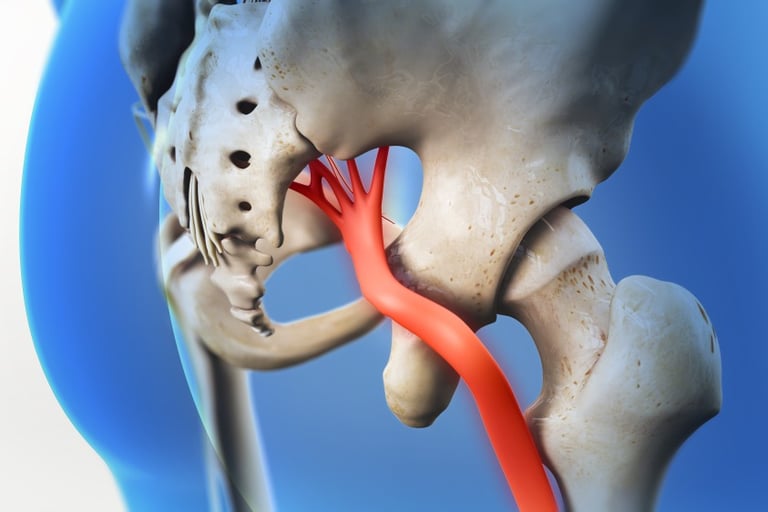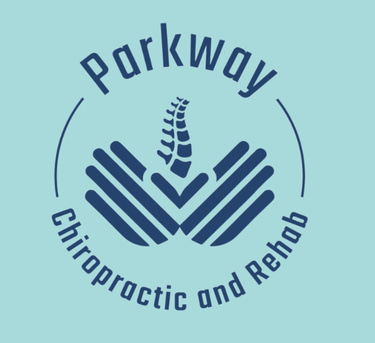Pinched Nerve Relief at Parkway Chiropractic and Rehab: Alleviate Pain and Restore Mobility
At Parkway Chiropractic and Rehab, we specialize in providing safe, natural, and effective treatment for pinched nerves. A pinched nerve occurs when too much pressure is applied to a nerve by surrounding tissues—such as muscles, bones, cartilage, or tendons. This pressure disrupts the nerve’s normal function, leading to symptoms that range from mild discomfort to severe pain. Our chiropractic approach focuses on relieving pressure, improving nerve function, and promoting long-term spinal health.
What is a Pinched Nerve?
A pinched nerve happens when a nerve is compressed or irritated by surrounding tissues, such as bone, cartilage, muscle, or tendons. This pressure can occur in various parts of the body, most commonly in the neck, lower back, or shoulders. The pinching may happen due to poor posture, repetitive movements, an injury, or other underlying health conditions. When a nerve is pinched, it may not function properly, causing a range of symptoms like pain, numbness, tingling, and weakness.
Common areas where pinched nerves occur include:
Cervical Spine (Neck): Pinched nerves in the neck often lead to neck pain, headaches, and tingling in the arms or hands.
Lumbar Spine (Lower Back): Pinched nerves in the lower back can result in sciatica, causing pain that radiates down the leg.
Shoulders and Elbows: Nerve compression in the shoulders or elbows can lead to pain and numbness in the arms or hands.
Common Symptoms of a Pinched Nerve
The symptoms of a pinched nerve can vary depending on the location and severity of the compression. Common signs of a pinched nerve include:
Sharp or Shooting Pain: Pain may be sudden and sharp, typically in the area where the nerve is compressed (neck, back, shoulder, or limb).
Numbness or Tingling: Often described as "pins and needles," numbness or tingling sensations can occur in the area served by the affected nerve, such as the arms, hands, legs, or feet.
Weakness: Muscle weakness in the affected area can make it difficult to perform everyday tasks or movements.
Radiating Pain: The pain may travel along the nerve's path, causing discomfort in areas far from the original compression, such as down the leg or arm.
Limited Range of Motion: A pinched nerve in the neck or lower back can cause stiffness and make it difficult to move your head, neck, or back.
Burning Sensation: Some people may experience a burning feeling where the nerve is pinched, particularly in the arms, hands, or legs.
Who is Most Likely to Experience a Pinched Nerve?
Pinched nerves can affect anyone, but certain groups are at higher risk. People who engage in repetitive movements or certain activities that put stress on the spine, muscles, and joints are more likely to develop a pinched nerve. Common risk factors include:
Age: As we age, the spinal discs and joints undergo wear and tear, which can lead to conditions like herniated discs or bone spurs that press on nerves.
Poor Posture: Poor posture, especially when sitting for long periods or slouching, can contribute to nerve compression, particularly in the neck and lower back.
Repetitive Movements: People who perform repetitive movements (such as typing, lifting, or bending) are at a higher risk of pinched nerves due to strain on the muscles and joints.
Overuse Injuries: Repetitive activities or sports can lead to injuries like muscle strains or disc herniations that place pressure on nerves.
Obesity: Carrying excess weight can put added pressure on the spine and joints, increasing the risk of pinched nerves, particularly in the lower back.
Injury: Auto accidents, falls, or sudden jerky movements can damage the spine, leading to a pinched nerve.
Conditions like Arthritis or Disc Herniation: Conditions that cause inflammation or structural changes in the spine (such as arthritis or disc herniation) are common causes of nerve compression.
How Chiropractic Care Helps with Pinched Nerves
Chiropractic care offers a safe and effective approach for treating pinched nerves without the need for invasive procedures or medications. By focusing on realigning the spine, reducing nerve pressure, and restoring proper function, chiropractic care promotes natural healing.
Here’s how chiropractic care helps with pinched nerves:
Spinal Adjustments: Chiropractic adjustments realign the spine, helping to relieve pressure on the affected nerve. This can significantly reduce pain and restore normal nerve function. Adjustments can also help to reduce muscle spasms that may be contributing to nerve compression.
Reducing Inflammation: Chiropractic care helps reduce inflammation around the affected nerve, which is a major contributor to pain and discomfort. With proper adjustments, blood flow is restored, promoting natural healing.
Improving Mobility: Chiropractic adjustments and therapeutic exercises can help improve flexibility and range of motion, particularly in the neck, back, shoulders, and limbs. This improves function and reduces stiffness.
Preventing Future Nerve Compression: Regular chiropractic care helps prevent future episodes of pinched nerves by improving spinal alignment, posture, and joint function. By addressing misalignments and imbalances in the spine, chiropractic care can reduce the risk of nerve compression in the future.
Holistic Healing: Chiropractic care takes a holistic approach to healing, addressing not only the immediate symptoms but also the underlying causes of nerve compression. In addition to spinal adjustments, your chiropractor may recommend exercises, stretches, and lifestyle modifications to improve overall spinal health and prevent future nerve irritation.
Benefits of Chiropractic Care for Pinched Nerves
Pain Relief: Chiropractic adjustments help reduce pain caused by nerve compression, providing relief without the need for medication.
Restored Function: Chiropractic care helps improve joint mobility and restores function to the affected area, allowing you to return to daily activities with greater ease.
Reduced Muscle Tension: By addressing misalignments in the spine and muscles, chiropractic care helps alleviate tension and spasms that may be contributing to nerve compression.
Long-Term Relief: Chiropractic care focuses on correcting the root cause of pinched nerves, leading to long-lasting results rather than just temporary symptom relief.
Improved Posture: Chiropractic adjustments help improve posture, reducing strain on the spine and muscles, which can prevent future pinched nerves.
Rehabilitation Exercises for Pinched Nerves
In addition to chiropractic adjustments, rehabilitation exercises can help strengthen muscles, improve posture, and support the healing process. Some common exercises for pinched nerves include:
Stretching: Gentle stretches help relieve tension in the muscles surrounding the affected nerve, improving flexibility and reducing pressure.
Strengthening Exercises: Targeted exercises to strengthen the muscles around the affected area (neck, back, shoulders, etc.) can help stabilize the spine and prevent future nerve compression.
Posture Training: Proper posture is essential for preventing nerve compression. Your chiropractor may recommend exercises that teach you how to maintain good posture throughout daily activities.
Why Choose Chiropractic Care for Pinched Nerves at Parkway Chiropractic and Rehab?
Personalized Treatment Plans: We offer customized care based on your unique condition, symptoms, and health goals.
Non-Surgical, Drug-Free Solutions: Chiropractic care offers a natural approach to healing without the need for medications or surgery.
Comprehensive Care: We combine chiropractic adjustments, rehabilitation exercises, and lifestyle modifications to provide a holistic approach to healing.
Expert Guidance: Dr. William Soris and our experienced team will guide you through your treatment plan to ensure the best possible outcome.
Start Your Journey to Nerve Relief Today
If you're experiencing pain, numbness, or tingling due to a pinched nerve, chiropractic care at Parkway Chiropractic and Rehab can help. Let us help you relieve pain, restore mobility, and improve your overall health.
Book your appointment today and take the first step toward healing from a pinched nerve!


Parkway Chiropractic and Rehab
© 2024. All rights reserved.
⏰ Office Hours
🌟 Monday to Friday:
🕘 9:00 AM – 6:00 PM
🌟 Saturday:
🕘 9:00 AM – 12:00 pm


